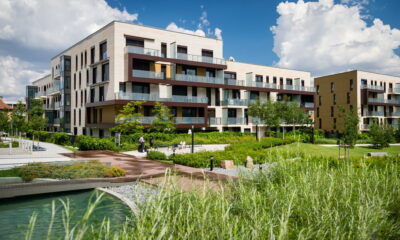Features
The Green, Green Grass of Home
Are environmentally-friendly guest houses and hotels getting the upper hand?
We’re all familiar with the rosettes and stars brandished by guest houses and hotels, but did you know that they might also sport green awards for their environmental performance? The Green Tourism Business Scheme (GTBS) has been assessing various kinds of accommodation for 13 years, starting in the Shetland Islands and spreading throughout the UK and many parts of Ireland. About 2,200 establishments now sport one of the “Green Tourism” logos on their premises, promotional materials and websites.

Assessments are based on over 150 measures and some can offset others. For example, a historic building could be ruined by double glazing, but earn points for recycling or some form of local community involvement. Once assessed, they are awarded Gold, Silver, Bronze or “Going Green” status.
Some recent research done by VisitEngland revealed that most people are not that interested in “overt sustainability”. Just 7 percent have taken a volunteering holiday. And only 13 percent claim to have ever stayed in accommodation with green awards or environmentally-friendly practices. (Perhaps they hadn’t noticed, since some big name hotel chains have earned green tourism awards – Ed.) The same research revealed that over 50 percent were interested in staying in environmentally-attuned accommodation and about the same number in break locations that benefit the local community. However, the same number agreed, “I don’t want to have to think about being green (on holiday in England); I just want to relax.”
The general public are not the only users of accommodation. Organisations are huge buyers and, if they have a strong environmental ethic, it’s highly likely they will choose hotels and guest houses with similar values. Given the general drift towards environmental awareness, this can only be good news for hoteliers and the like who seize the initiative now and build a loyal customer base before “environmentalism” becomes the norm.
At least when everyone’s doing it, establishments can still strive for the Gold standard. Of course, environmentalism may become part of the established grading systems, but that’s for the future. Right now, the “Green Tourism” logo is the principal mark of credibility.
Andrea Nicholas is Managing Director of the GTBS and she talks about the dark and light sides of her organisation’s work. On the dark side she admits that a lot of environmental claims people make are born of ignorance. Some think that “locally sourced food” means “from a nearby supermarket” until the term is explained. Or maybe they claim to minimise energy consumption while keeping empty minibars plugged in or office computers switched on at night. These are the sorts of things an inspection can easily spot and correct.
Nicholas speaks of the most common eco-fibs: “a towel reuse policy which is ignored”; “fairtrade coffee and tea promises not fulfilled in hospitality tray sachets”; and “claims to minimise waste disproved by individual cereal packets or bottled water”. She also highlights phrases to look out for, such as “… wherever possible” and “… as much as we can”, pointing out that they sound like solemn pledges but are fluffy to the point of being meaningless.
On the light side Nicholas talks about hotels that have gone above and beyond the environmental call of duty. For example, the Lancaster Hotel has installed beehives on its roof and serves guests its own honey; Gleneagles asks for a voluntary £1 per night towards the restoration of local orchards, which will eventually supply the hotel with crops; and Carey’s Manor in the New Forest gives a 10 percent discount on guests’ bills if they don’t use their cars during their stay. All of these examples show people taking environmentalism to heart and probably reflecting the culture of the hotel as a whole.
Nicholas believes the way to change the culture in hotels is to ensure that managers are appropriately “green-minded”. She even believes that green personality testing will soon become a recruitment requirement, and suggests that any venue would fail to meet environmental standards only by taking “a bolt-on rather than a built-in approach”.
These are wise words indeed – and ought to be noted by all organisations that treat environmental activities as somehow separate from their business.


 Environment12 months ago
Environment12 months agoAre Polymer Banknotes: an Eco-Friendly Trend or a Groundswell?

 Features11 months ago
Features11 months agoEco-Friendly Cryptocurrencies: Sustainable Investment Choices

 Features12 months ago
Features12 months agoEco-Friendly Crypto Traders Must Find the Right Exchange

 Energy11 months ago
Energy11 months agoThe Growing Role of Solar Panels in Ireland’s Energy Future





























